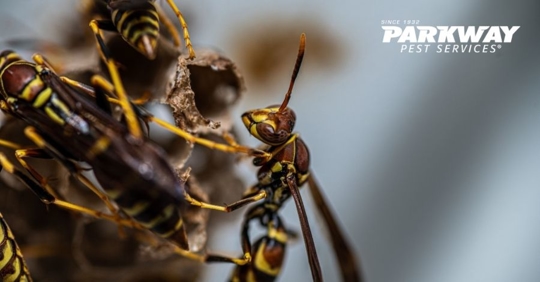If you've spent any time outdoors in New York this late summer and early fall, you may have noticed an unwelcome trend: yellowjackets seem to be everywhere, and they're not in a good mood. While these social wasps are a nuisance throughout the warmer months, their behavior in the fall can become particularly aggressive and concerning for homeowners and families.
The Yellowjacket Lifecycle and Fall Behavior
To understand why yellowjackets are so aggressive now, we need to look at their annual lifecycle. A yellowjacket colony is founded by a single queen in the spring. She builds a small nest and lays eggs, and the first generation of worker wasps emerges to take over the task of foraging for food. Throughout the spring and summer, these workers tirelessly hunt for protein—caterpillars, flies, and other insects—to feed the developing larvae in the nest. In return, the larvae secrete a sugary substance that the adult wasps consume. This is a mutually beneficial arrangement that keeps the colony functioning smoothly.
By late summer and early fall, the queen's focus shifts. Instead of producing more workers, she begins to lay eggs that will develop into new queens and male drones. As these new reproductive wasps mature, the colony's need for protein decreases. At the same time, the existing larvae—the source of the sugary food for the workers—are maturing and pupating. The once-plentiful food source for the adult workers is drying up.
Desperate for Sugar
This is where the problem for us begins. With their primary food source dwindling, the now-jobless yellowjacket workers are on the hunt for a new energy source. They're not looking for protein to feed the young; they're looking for simple carbohydrates—sugar.
This is why you'll find them buzzing around your outdoor picnic, your trash cans, and particularly your soda cans and sweet drinks. They are desperate, hungry, and no longer have a "job" of feeding the young, making them much more volatile and unpredictable. Their behavior is driven by a biological need for survival, which translates into aggressive defense of any perceived food source. This desperation can lead to more frequent stings, even when unprovoked, as they are no longer focused on their colony's well-being but on their individual survival.
What You Can Do
First, avoid attracting them. Be sure to seal trash cans tightly and clean up any spills from sweet drinks or food immediately. If you're eating or drinking outside, consider using lidded cups. Avoid swatting at them; this will only make them more agitated and increase the likelihood of a sting.
It's also crucial to remember that yellowjackets often build their nests in hidden locations—underground, in wall voids, or inside dense shrubs. A single nest can contain thousands of wasps, and disturbing it can be extremely dangerous. The wasps will defend their home with an aggressive, coordinated attack.
If you suspect you have a yellowjacket nest on your property, do not attempt to remove it yourself. Their defensive behavior in the fall makes this particularly risky. For New York residents, professional pest control is the safest and most effective solution.
Call Long Island Pest Control Services
If yellowjackets are making your property unbearable, the experts at Parkway Pest Services can help. We have the knowledge and tools to safely and effectively locate and eliminate stinging insects and their nests, protecting you and your family from these aggressive pests. Don't let these late-season invaders ruin your outdoor enjoyment.
Contact us today at (888) 695-6490 to schedule a consultation.

